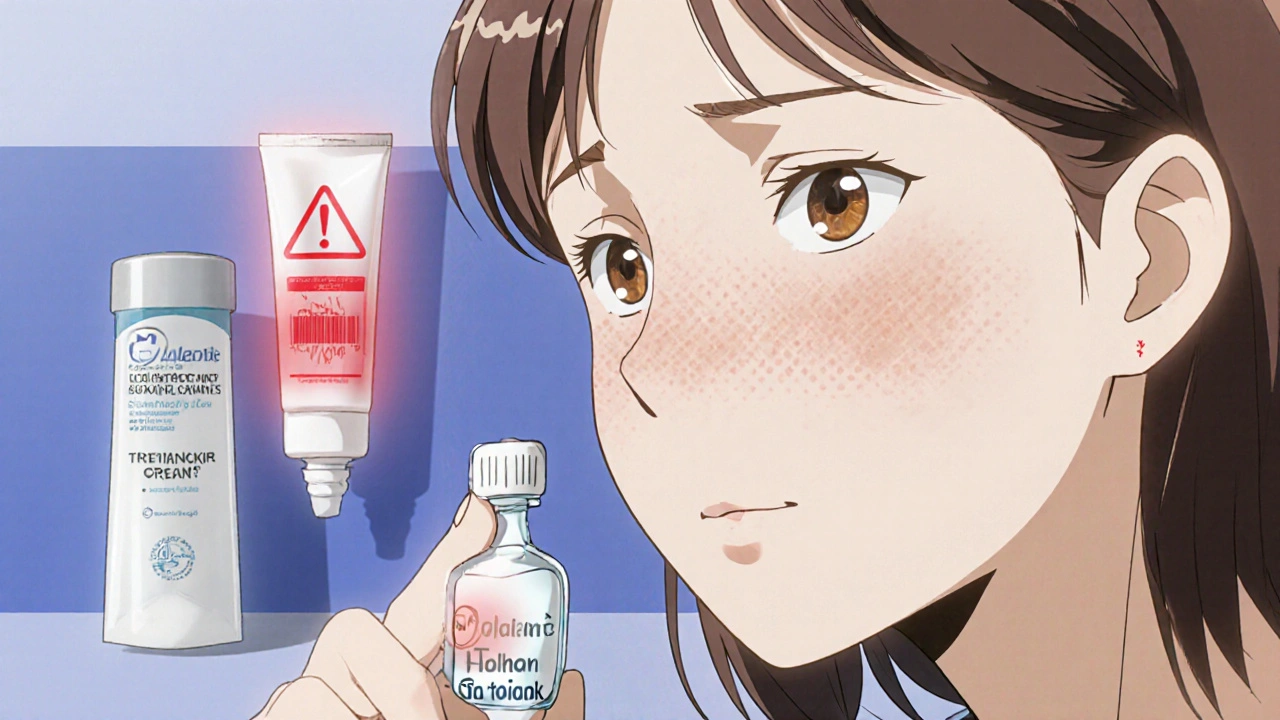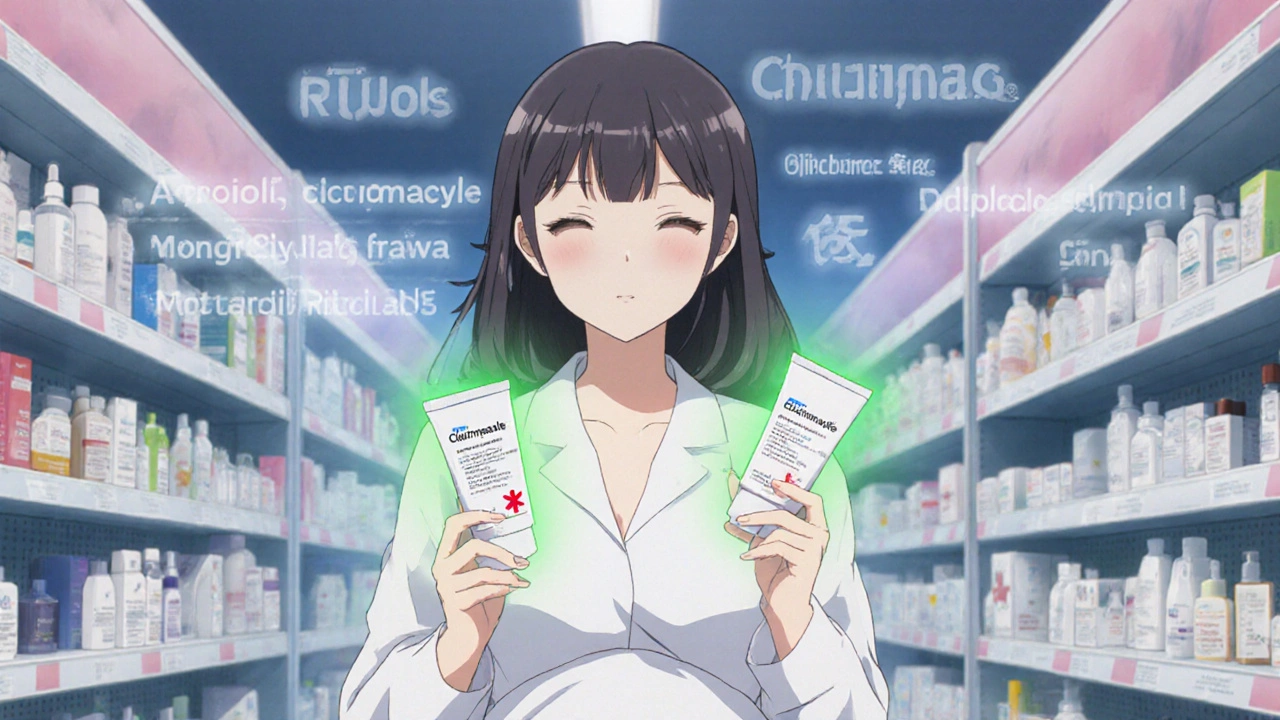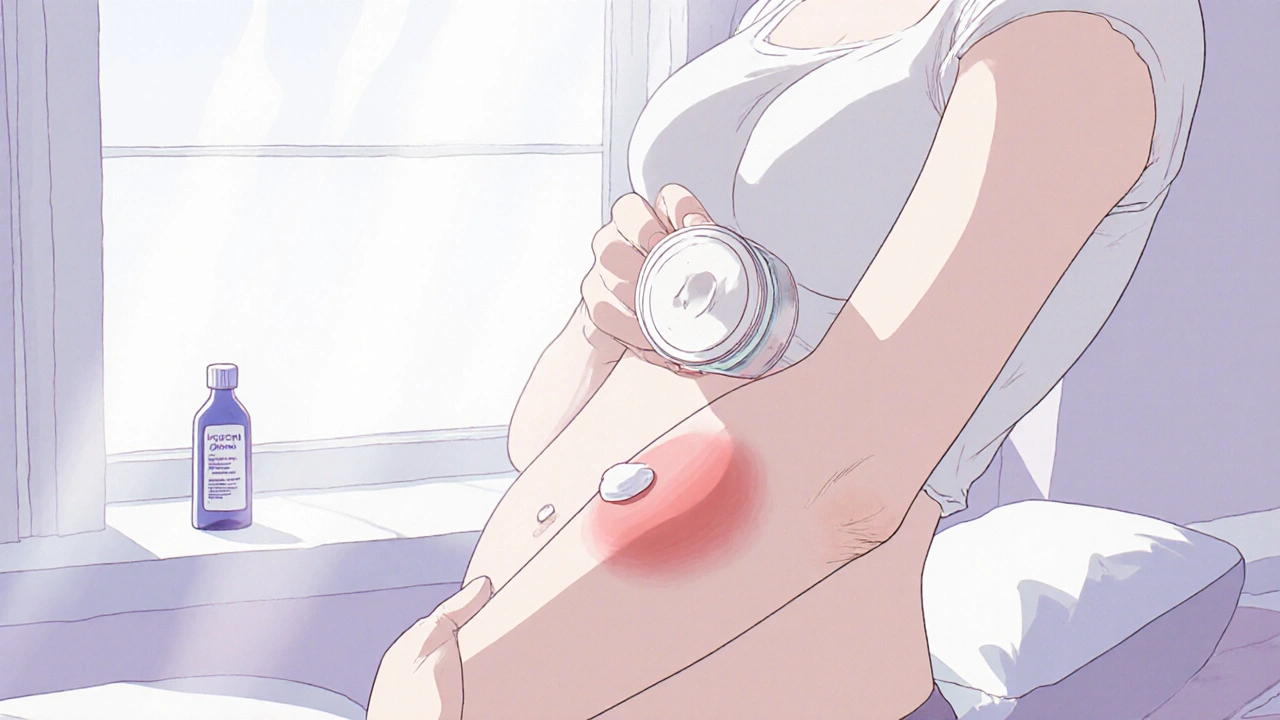When you're pregnant, even the smallest decision about what you put on your skin can feel overwhelming. That eczema flare-up? The acne popping up out of nowhere? The itchy rash from hormonal changes? You want relief-but you also don’t want to risk your baby’s health. The good news: topical medications are often safer than pills or injections because they barely enter your bloodstream. But not all creams are created equal. Some are fine. Others? Avoid them completely.
Why Topical Creams Are Usually Safer
Most topical treatments-like creams, gels, and lotions-get absorbed through the skin in tiny amounts. Studies show less than 10% of the product enters your blood, and often it’s under 1%. That’s why a hydrocortisone cream for eczema or a benzoyl peroxide wash for acne is usually considered low-risk. Your baby gets exposed to far less than if you took the same medicine by mouth. But here’s the catch: absorption isn’t the same everywhere. Your face, neck, armpits, and groin absorb more than your arms or legs. That means applying a strong steroid cream to your face could expose your baby to more than using the same cream on your forearm. Always use the smallest amount needed, and only where necessary.Safe Topical Treatments for Common Pregnancy Skin Issues
Many skin problems flare up during pregnancy. Here’s what’s generally safe to use, backed by guidelines from the American College of Obstetricians and Gynecologists (ACOG), the American Academy of Dermatology, and the European Academy of Dermatology and Venereology:- Hydrocortisone cream (1%) - The go-to for eczema, bug bites, and itching. Low potency, minimal absorption. Safe for short-term use.
- Benzoyl peroxide (5-10%) - A top pick for pregnancy acne. Doesn’t enter the bloodstream in meaningful amounts. No proven risk to babies.
- Clindamycin and erythromycin (topical antibiotics) - Used for acne and infections. Both are Category B-no evidence of harm in human studies.
- Clotrimazole, miconazole, nystatin - These antifungal creams treat yeast infections and athlete’s foot. First-line choices during pregnancy.
- Azelaic acid (15-20%) - Great for melasma (the pregnancy mask) and acne. Safe, non-irritating, and effective. Many women report clear skin without side effects.
- Acyclovir cream - For cold sores. Minimal absorption. Safe at any stage.
Topical Medications to Avoid During Pregnancy
Some products sound harmless-but they’re not. Even if they’re applied to the skin, they can still cross the placenta or cause harm in rare cases. These should be off-limits:- Topical retinoids - This includes tretinoin (Retin-A), adapalene (Differin), and tazarotene. Even though they’re applied topically, case reports link them to birth defects when used in early pregnancy. ACOG advises stopping these before trying to conceive.
- Salicylic acid (oral or high-dose topical) - Low concentrations in acne toners (2% or less) are usually fine. But avoid peels, spot treatments over large areas, or anything with more than 5%. High doses can affect fetal development, especially in the third trimester.
- Topical NSAIDs - Think diclofenac gel or ibuprofen cream. While they’re absorbed less than pills, they still carry risks late in pregnancy. After 30 weeks, they can cause the baby’s ductus arteriosus (a blood vessel) to close too early, leading to heart problems.
- Podofilox and podophyllin - Used for genital warts. These are toxic and can cause severe birth defects. Never use them during pregnancy.
- Strong corticosteroids (Class I or II) - Clobetasol, betamethasone, and halobetasol should only be used if absolutely necessary and for the shortest time possible. Long-term or widespread use is linked to low birth weight.
What About Over-the-Counter Products?
You might think “natural” or “drugstore” means safe. Not always. Many OTC products contain hidden ingredients that aren’t pregnancy-friendly. For example:- Some acne spot treatments claim to be “gentle” but contain salicylic acid at 10% or higher.
- Anti-aging creams often include retinol or retinaldehyde-both forms of retinoids. Even if labeled “cosmetic,” they can still be absorbed.
- Herbal creams like calendula or tea tree oil have little safety data in pregnancy. Stick to proven, well-studied options.

How to Use Topical Treatments Safely
Even safe products can cause problems if used the wrong way. Follow these simple rules:- Use the smallest amount possible. A pea-sized dab is enough for a quarter-sized area.
- Avoid applying to large areas of skin. The more surface area, the more absorption.
- Don’t use on broken or raw skin. That increases absorption significantly.
- Wash your hands after applying. You don’t want to accidentally transfer the product to your eyes or mouth.
- Stop using if you get redness, burning, or swelling. It could be irritation-or an allergic reaction.
- When in doubt, ask. Your OB-GYN or a dermatologist can help you choose the safest option.
What to Do If You Accidentally Used Something Risky
It happens. Maybe you didn’t know you were pregnant and kept using your Retin-A. Or you bought a new moisturizer and later realized it had retinol. Don’t panic. The risk is often lower than you think. Most case reports of birth defects from topical retinoids involve heavy, long-term use-not occasional application. Still, call your doctor. They can check your history, assess your risk, and reassure you. The InfantRisk Center handles over 1,200 pregnancy medication questions every month. They’re a trusted resource for doctors and patients alike. If your provider isn’t sure, they can call them for guidance.Labeling Confusion: Why It’s Hard to Know What’s Safe
You might notice something odd: product labels don’t always tell you if something is safe during pregnancy. That’s because the FDA stopped using the old A, B, C, D, X categories in 2015. Now, labels have narrative summaries-but many companies haven’t updated theirs yet. A 2023 study found only 37% of topical dermatology products include clear pregnancy safety info. So even if the box says “for acne,” it doesn’t mean it’s safe for you right now. That’s why relying on your doctor or pharmacist matters more than ever. Don’t trust the label alone. Ask for the active ingredient, then look up its safety profile in trusted sources like ACOG or the InfantRisk Center.
Real Stories, Real Concerns
One mom in Adelaide told her doctor she’d been using a salicylic acid cleanser for months before she knew she was pregnant. She was terrified-but her OB reassured her that the low dose and limited use made serious risk unlikely. She switched to benzoyl peroxide and had a healthy baby. Another woman accidentally used a prescription steroid cream on her face for two weeks while pregnant. She worried for weeks. Her doctor checked her dosage and timing-it was well below the threshold linked to growth issues. She still had a healthy child. But then there’s the story of the woman who kept taking Accutane (oral isotretinoin) for months after conceiving. She had to make the heartbreaking decision to terminate the pregnancy. That’s why the rule is simple: never use oral retinoids during pregnancy. And if you’re on them, use two forms of birth control.When to See a Specialist
If you’re struggling with persistent acne, eczema, or rashes during pregnancy, don’t suffer in silence. About 82% of OB-GYNs consult with dermatologists for these cases. You don’t have to guess what’s safe. A dermatologist can:- Identify what’s causing your skin issue
- Recommend the safest treatment based on your trimester
- Prescribe alternatives if OTC products aren’t working
- Monitor for side effects
Final Takeaway: You Can Treat Your Skin-Safely
Pregnancy doesn’t mean you have to live with itchy, inflamed, or acne-prone skin. There are plenty of safe, effective options. Stick to the basics: benzoyl peroxide, low-dose hydrocortisone, azelaic acid, and antifungals like clotrimazole. Avoid retinoids, high-dose salicylic acid, and strong steroids unless your doctor says otherwise. Always check ingredients. Use less, not more. And when you’re unsure-ask. You’re not being overly cautious. You’re being smart.Is hydrocortisone cream safe during pregnancy?
Yes, 1% hydrocortisone cream is considered safe for short-term use during pregnancy. It’s a mild steroid with very low absorption into the bloodstream. Use it only on affected areas, avoid large patches of skin, and don’t use it daily for more than a week without checking with your doctor.
Can I use acne cream while pregnant?
Some acne creams are safe, others aren’t. Benzoyl peroxide and topical clindamycin or erythromycin are considered safe. Avoid any product with retinoids (tretinoin, adapalene, retinol) or high-dose salicylic acid (over 5%). Always check the ingredient list.
Is it safe to use antifungal cream for a yeast infection during pregnancy?
Yes. Clotrimazole, miconazole, and nystatin are first-line treatments for vaginal yeast infections during pregnancy. They’re applied locally and don’t absorb into the bloodstream in significant amounts. Avoid econazole in the first trimester unless directed by your doctor.
Can topical NSAIDs like diclofenac gel cause problems in pregnancy?
Yes, especially after 30 weeks. Topical NSAIDs can still be absorbed enough to affect the baby’s heart by closing the ductus arteriosus too early. Use them only before 30 weeks and only if absolutely necessary. Talk to your doctor before using any pain-relief gel.
What should I do if I used a retinoid cream before I knew I was pregnant?
Stop using it immediately and contact your doctor. While case reports of birth defects from topical retinoids are rare and often involve heavy, long-term use, it’s important to get professional advice. Your doctor can assess your exposure level and may recommend extra monitoring. Don’t panic-many women have used retinoids early in pregnancy and gone on to have healthy babies.
Are natural or organic skincare products safe during pregnancy?
Not necessarily. “Natural” doesn’t mean safe. Many plant-based oils, extracts, and essential oils lack safety data in pregnancy. Some, like tea tree oil or lavender, may interfere with hormones. Stick to products with well-studied ingredients like azelaic acid or benzoyl peroxide instead of guessing with “clean” labels.


Just used hydrocortisone on my arms for two weeks straight because my eczema was screaming. No issues. Baby’s now 8 months old and still thinks socks are a personal attack. Zero birth defects, just a very confused toddler.
One must interrogate the epistemological foundations of topical safety paradigms. The FDA’s 2015 labeling overhaul, while ostensibly consumer-centric, has engendered a hermeneutic vacuum wherein pharmaceutical nomenclature becomes a Rorschach test for maternal anxiety. The absence of categorical classification does not equate to absence of risk-it merely transfers epistemic burden onto the pregnant individual, who is neither pharmacologist nor toxicologist.
Moreover, the conflation of ‘natural’ with ‘safe’ constitutes a semiotic fallacy, rooted in the romanticization of botanicals absent rigorous teratogenic screening. Tea tree oil, for instance, exhibits estrogenic activity in murine models-a fact obscured by marketing semantics. One cannot outsource clinical judgment to the beauty aisle.
Canada’s got this. We don’t need American panic marketing. My cousin used Retin-A for three months before she knew she was pregnant-baby came out perfect, now runs a hockey academy. You’re not a lab rat. Stop overthinking. This is Canada, not Silicon Valley.
Also, why are we letting Big Dermatology scare us? Hydrocortisone is literally in baby wipes. If it’s safe for a 2-month-old’s butt, it’s safe for your face. 🤷♀️
Ugh. I used a salicylic acid toner for six weeks before I realized I was pregnant. I spent three days crying, googling, and then yelling at my husband for not reading the label. Turns out? My OB laughed. Said the concentration was under 2% and I used it once a day. Baby’s now a screaming 2-year-old who hates baths. No defects. Just a very dramatic mom.
But seriously? If you’re using a ‘natural’ acne cream with ‘essential oils’ and it costs more than your rent, stop. It’s not magic. It’s marketing.
Thank you for this. I was so scared to use anything. I’ve been using azelaic acid since week 6 and my melasma is actually fading. I feel like myself again. You’re not being vain-you’re being human.
Look, I’m not a doctor, but I read a Reddit thread once and now I’m basically Dr. Google. Benzoyl peroxide? Fine. Retinol? Evil. Salicylic acid? Only if it’s not more than 5% and you’re not using it on your entire back like a human spa day. And if you’re using ‘natural’ oils, you’re just putting tree juice on your face and hoping for the best. Also, don’t use diclofenac gel after 30 weeks. I saw a guy on TikTok say his baby’s heart stopped. Probably fake, but I’m not risking it.
I used clotrimazole for a yeast infection in my second trimester. Didn’t even think twice. My OB said it’s the gold standard. Baby’s now 14 months and still steals my socks. Zero issues. Just follow the guidelines and don’t let fear make you suffer.
While the empirical data regarding low-dose topical retinoid exposure during the first trimester remains reassuring in the majority of case series, the absence of longitudinal cohort studies precludes definitive conclusions. The pharmacokinetic profile of retinoids, even when topically administered, demonstrates variable dermal absorption influenced by skin integrity, application frequency, and anatomical site. The precautionary principle, therefore, remains ethically and clinically justifiable.
Moreover, the proliferation of unregulated ‘clean beauty’ products introduces a novel public health challenge: the normalization of unvetted botanical actives under the auspices of consumer autonomy. The epistemic authority of the clinician must be reasserted in this context.
Topical NSAIDs = bad after 30 weeks. Diclofenac gel = no. Retinoids = no. Benzoyl peroxide = yes. Hydrocortisone 1% = yes. Read the label. Don’t guess. Call your OB. Done.